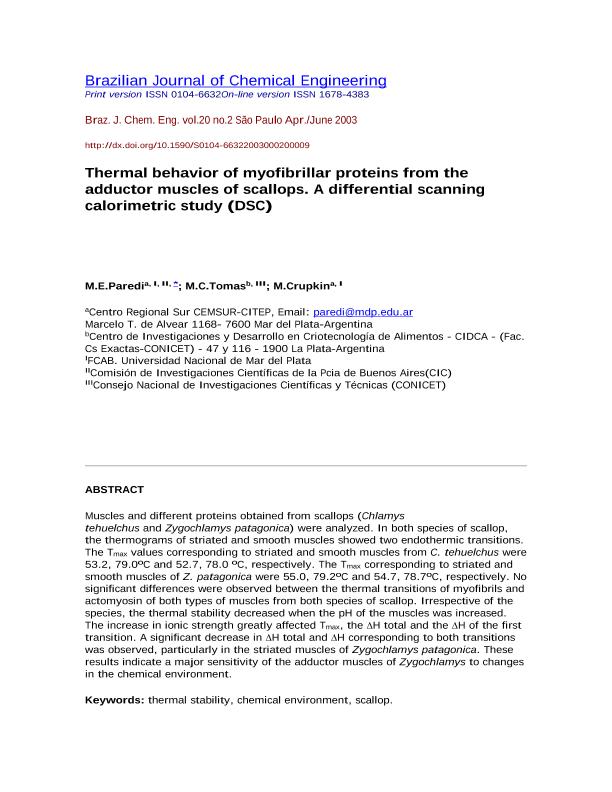Mostrar el registro sencillo del ítem
dc.contributor.author
Paredi, María Elida

dc.contributor.author
Tomás, Mabel Cristina

dc.contributor.author
Crupkin, Marcos

dc.date.available
2021-04-07T15:30:38Z
dc.date.issued
2003-06
dc.identifier.citation
Paredi, María Elida; Tomás, Mabel Cristina; Crupkin, Marcos; Thermal behavior of myofibrillar proteins from the adductor muscles of scallops. A differential scanning calorimetric study (DSC); Brazilian Society of Chemical Engineering; Brazilian Journal of Chemical Engineering; 20; 2; 6-2003; 153-159
dc.identifier.issn
0104-6632
dc.identifier.uri
http://hdl.handle.net/11336/129532
dc.description.abstract
Muscles and different proteins obtained from scallops (Chlamys tehuelchus and Zygochlamys patagonica) were analyzed. In both species of scallop, the thermograms of striated and smooth muscles showed two endothermic transitions. The Tmax values corresponding to striated and smooth muscles from C. tehuelchus were 53.2, 79.0°C and 52.7, 78.0°C, respectively. The Tmax corresponding to striated and smooth muscles of Z. patagonica were 55.0, 79.2°C and 54.7, 78.7°C, respectively. No significant differences were observed between the thermal transitions of myofibrils and actomyosin of both types of muscles from both species of scallop. Irrespective of the species, the thermal stability decreased when the pH of the muscles was increased. The increase in ionic strength greatly affected Tmax, the ΔH total and the ΔH of the first transition. A significant decrease in ΔH total and ΔH corresponding to both transitions was observed, particularly in the striated muscles of Zygochlamys patagonica. These results indicate a major sensitivity of the adductor muscles of Zygochlamys to changes in the chemical environment.
dc.format
application/pdf
dc.language.iso
eng
dc.publisher
Brazilian Society of Chemical Engineering

dc.rights
info:eu-repo/semantics/openAccess
dc.rights.uri
https://creativecommons.org/licenses/by/2.5/ar/
dc.subject
CHEMICAL ENVIRONMENT
dc.subject
SCALLOP
dc.subject
THERMAL STABILITY
dc.subject.classification
Alimentos y Bebidas

dc.subject.classification
Otras Ingenierías y Tecnologías

dc.subject.classification
INGENIERÍAS Y TECNOLOGÍAS

dc.title
Thermal behavior of myofibrillar proteins from the adductor muscles of scallops. A differential scanning calorimetric study (DSC)
dc.type
info:eu-repo/semantics/article
dc.type
info:ar-repo/semantics/artículo
dc.type
info:eu-repo/semantics/publishedVersion
dc.date.updated
2021-02-17T20:09:26Z
dc.identifier.eissn
1678-4383
dc.journal.volume
20
dc.journal.number
2
dc.journal.pagination
153-159
dc.journal.pais
Brasil

dc.journal.ciudad
San Pablo
dc.description.fil
Fil: Paredi, María Elida. Provincia de Buenos Aires. Gobernación. Comisión de Investigaciones Científicas; Argentina. Universidad Nacional de Mar del Plata. Facultad de Ciencias Agrarias; Argentina. Instituto Nacional de Tecnología Industrial. Centro Regional Sur (Pesca y Agroindustria); Argentina
dc.description.fil
Fil: Tomás, Mabel Cristina. Provincia de Buenos Aires. Gobernación. Comisión de Investigaciones Científicas. Centro de Investigación y Desarrollo en Criotecnología de Alimentos. Consejo Nacional de Investigaciones Científicas y Técnicas. Centro Científico Tecnológico Conicet - La Plata. Centro de Investigación y Desarrollo en Criotecnología de Alimentos. Universidad Nacional de La Plata. Facultad de Ciencias Exactas. Centro de Investigación y Desarrollo en Criotecnología de Alimentos; Argentina
dc.description.fil
Fil: Crupkin, Marcos. Universidad Nacional de Mar del Plata. Facultad de Ciencias Agrarias; Argentina. Instituto Nacional de Tecnología Industrial. Centro Regional Sur (Pesca y Agroindustria); Argentina
dc.journal.title
Brazilian Journal of Chemical Engineering

dc.relation.alternativeid
info:eu-repo/semantics/altIdentifier/doi/http://dx.doi.org/10.1590/S0104-66322003000200009
dc.relation.alternativeid
info:eu-repo/semantics/altIdentifier/url/https://tinyurl.com/yb7xjvks
Archivos asociados
